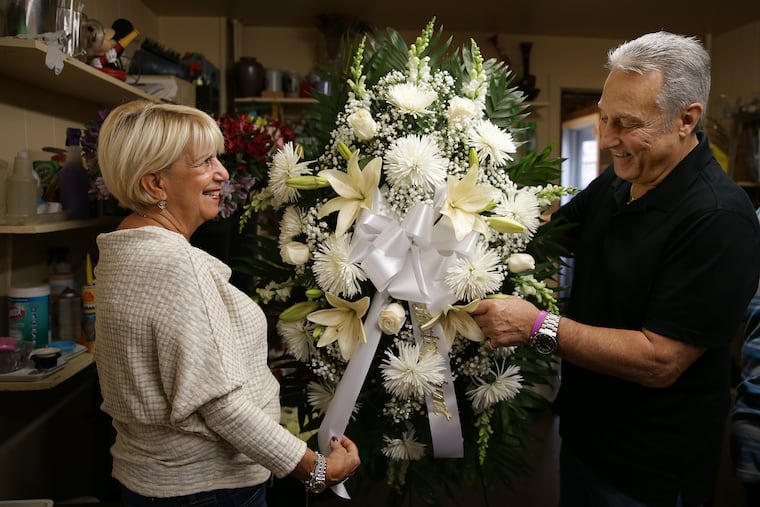After 50 years of elaborate funerals, a South Philly flower man stays true to his roots | Mike Newall
John Vacca is a throwback to an era when it took an army of craftsmen to bury a South Philadelphian right.

They opened the flower shop out of spite.
It was the late 1960s, and John Vacca was newly engaged and working for one of the South Philadelphia florists that lined the Great Dark Way — the stretch of 14 funeral homes that, at the time, lined Broad Street.
Vacca, who’d always been a natural artist, had struggled ever since he got out of the Army to find an outlet for his creative streak. Working construction didn’t do it. Neither did drafting school, or dressing window mannequins. He taught karate in the neighborhood — achieving a fifth-degree black belt — but it didn’t pay the bills.
That’s when John Vacca took a “flower class,” as he puts it, and found his calling. And his South Philly world opened up. He landed an entry-level job at one of the biggest shops on the Great Dark Way, and honed his craft working with a master of elaborate funeral sprays.
Then he bought a condemned building near Broad and Porter, thinking it could be a worthwhile investment. But word got out, as it did along the Way, that John and his bride-to-be, JoAnn, were thinking of introducing some new competition to Broad Street, opening their own shop. They weren’t. But John’s boss — of whom, to be clear, he still speaks reverently — fired him anyway.
“I said, `You know what? I am going to open a shop,' ” John said, laughing. “I opened up, really, for spite, not thinking I was going to stay here.
“And that’s it. Fifty years later.”
Today, almost no one calls South Broad the Great Dark Way anymore, or Death Row, or Funeral Home Row, or any of the other macabre nicknames once visited upon the street. The 14 funeral homes are down to five, and most of the original florists that served them — including two others on the Vaccas’ block alone — are long gone, except for the Vaccas’ shop, the Petal Pusher, celebrating its golden anniversary this year.
Amid a changing community, and a changing craft, John and JoAnn have endured by serving as links to the past.
“He is an heir of that era — the pioneers of beautiful flowers,” said Mark Rago, owner and director of the Monti-Rago funeral home. An era when it took an army of craftsmen to bury a South Philadelphian right.
When families would order a dozen elaborate flower arrangements — from empty chairs to the pearly gates opening, sometimes so tall they would take two attendants to carry. When it took two or three limos just to carry all the tributes. When people like John Vacca, and his teachers, would wake up at 2 a.m. to meticulously piece together sprays with wire and picks.
When men of a certain trade were buried, Rago recalls, the florists would know to call to inform the funeral home. “Save a spot up close to the coffin for flowers coming in from Atlantic City,” they would say. Or Kansas City, or Buffalo.
Even as the lavish funerals faded and the old generation turned from cherished customers to the dearly departed, John became known for his elaborate arrangements. He was called on to build specialty pieces. A horse’s head for a racetrack habitue. A produce truck for a beloved fruit-slinger. And for those men of that certain trade, a .38, say, made of carnations, or perhaps their favorite numbers, the ones they’d play in the racket.
"Cigars. Sports logos. Deer heads. Pool racks. Anything you can think of, he’s made,” JoAnn said. A crowning achievement? John’s slot machines made of carnations.
They built a life in the shop they started on a whim. JoAnn busy at the counter and at the books, the girls, Cheryl and Jill, and then the four grandkids, running up and down from the apartment upstairs, and John, quiet at the workbench in the back, sometimes all night.
“If you do it, do it right,” he said. “If not, don’t do it at all.”
And in that way, they built a name in their neighborhood. John for his eye for detail. JoAnn for her kindness, for the way she’d sit with grieving families in their living room. The way they cut neighbors a break without bragging about it.
“That’s why they’ve been in business for 50 years,” said Edie Pepe, a longtime friend and customer. John and JoAnn buried her Aunt Mary and her father, Joe. “It’s not about the money. It’s the way they do business. They’re just good people.”
And they’re busy still, even if the Easter rush is no longer as big and the orders come over the computer instead of over the counter. The store built out of spite, that wasn’t supposed to last, outlasted them all.